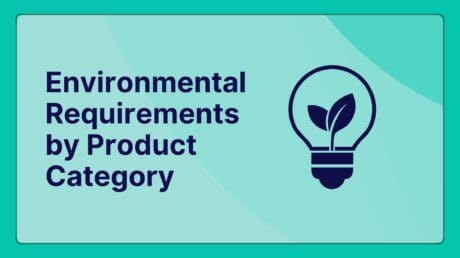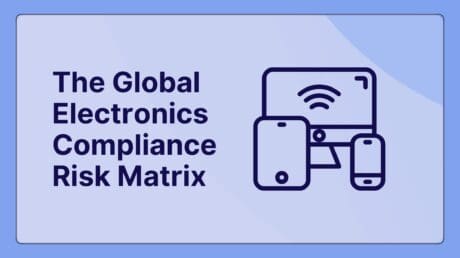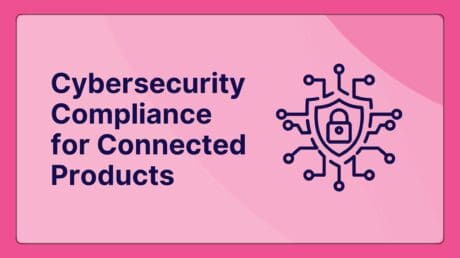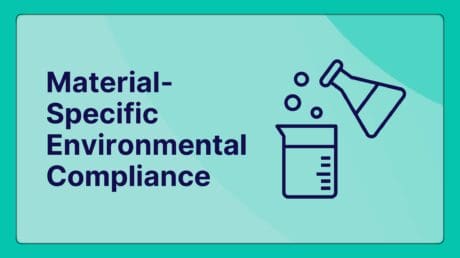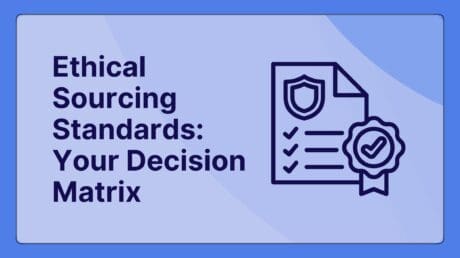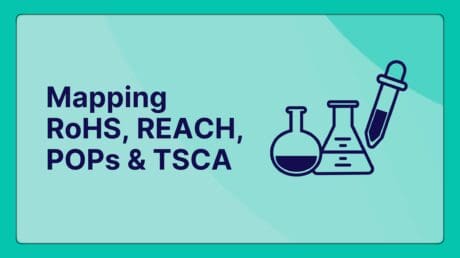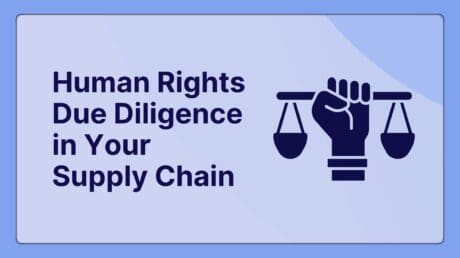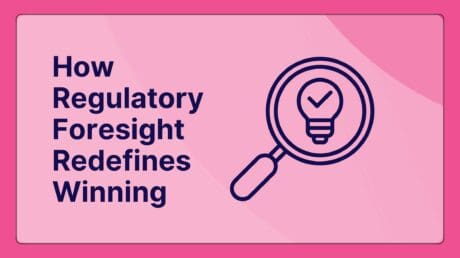
Product & Sustainability Developments in Latin America

This blog was originally posted on 6th August, 2025. Further regulatory developments may have occurred after publication. To keep up-to-date with the latest compliance news, sign up to our newsletter.
AUTHORED BY CECILIA FERREIRA DE CARVALHO, REGULATORY COMPLIANCE SPECIALIST, AND LUISA TORO CORREA, REGULATORY COMPLIANCE SPECIALIST, COMPLIANCE & RISKS
This overview highlights recent efforts and regulatory developments across several Latin American countries in the first semester of 2025, emphasizing climate action, circular economy initiatives, waste management, energy efficiency, AI, and data protection. Legislation on medical devices and chemicals is excluded, as those topics are covered in dedicated content.
What Are the Latest Environmental Efforts and Developments in Brazil?
As the host nation of COP30, Brazil is stepping into the global spotlight, highlighting its commitment to climate action and environmental governance through the development and approval of key legislation.
As part of the Climate Plan, Brazil launched public consultations for the National Adaptation Strategy and for the National Mitigation Strategy, the latter open for feedback until August 18, 2025. In parallel with these developments, Brazil launched a public consultation for the technical notebooks of the Brazilian Sustainable Taxonomy (TSB). The consultation addressed preliminary proposals prepared by Sectoral and Thematic Technical Groups. The final version is expected to be published in August 2025.
Another key update is significant progress on Brazil RoHS, the draft resolution regulating hazardous substances in electrical and electronic equipment (EEE). Now moving through CONAMA for final approval, this measure aligns Brazil with global efforts for sustainable product lifecycles and is expected to be approved in the coming months.
Companies operating in Brazil should proactively prepare to meet evolving compliance requirements and leverage new opportunities for sustainable growth.
How Is Mexico Advancing Toward a Circular Economy?
Mexico is making progress toward a greener future with proposed amendments and laws in 2025, mainly targeting waste management and the circular economy. These efforts aim to lower high emissions and promote sustainability across sectors and daily activities. In June, a comprehensive General Law on Circular Economy and Waste Management to Mitigate Gas Emissions was proposed to lower greenhouse gas (GHG) emissions, improve resource efficiency, and overhaul waste management by urging individuals and businesses to implement practices and technologies that focus on efficiency and material reuse, from design to disposal. This initiative aligns with a January Draft Law on “Prevention and Comprehensive Waste Management in Circular Economy,” emphasizing reduction, reuse, and recycling.
Additionally, specific waste streams are under scrutiny, with proposed amendments targeting lithium-ion battery waste, Waste Electrical and Electronic Equipment (WEEE), and a significant focus on plastic waste management, possibly including a ban on most single-use plastics.
Mexico City aligns with national initiatives through bold reforms. A proposed Waste Act in March defines waste, promotes a circular economy, and extends producer responsibility for packaging, electronics, and batteries. It bans certain single-use plastics and encourages compostable and recyclable options for e-commerce packaging. Mexico City also aims to reduce light pollution by amending its Environmental Protection Law to require mitigation programs for “intrusive light.” These legislative steps demonstrate Mexico’s commitment to sustainability and environmental stewardship.
What Are the Latest Developments in Chile’s Recycling Law?
In 2025, Chile has seen significant developments in the implementation and further developments of Law No. 20.920, known as the REP Law. Initially, the regulation covered six priority products, but as of June, textiles have been added to the list, becoming fully subject to the obligations established under the REP Law.
In line with this, the Ministry of the Environment has officially launched an information request process requiring producers of priority products, including textiles, to submit 2024 commercialization data by 15 September 2025.
Continuing these efforts, the Council of Ministers for Sustainability and Climate Change approved the decree setting collection and recovery targets for batteries and electrical and electronic devices, including photovoltaic panels and temperature exchange appliances, in June 2025.
Following approval, the decree will be sent to the President of the Republic for signature and, ultimately, for publication in the Official Gazette, which is expected in the coming months.
Want to dive deeper into global sustainability trends? Watch our recent webinars on Asia’s ESG & Sustainability Landscape: Compliance Essentials for 2025 and ESG Regulatory Developments in the US.
How Are Colombia and Peru Proposing to Enhance Waste Management?
In Colombia, a proposal in relation to the comprehensive management of hazardous waste was issued in February 2025.
The initiative aims to amend the Single Environmental Regulation by incorporating the principles and guidelines of the Basel Convention. The changes focus on strengthening the comprehensive management of hazardous waste, updating guidelines for classification, handling, transportation, and final disposal, while promoting improved environmental safety and producer responsibility.
The consultation period for this initiative has concluded, and to date, no further updates have been provided. If approved, companies should expect new obligations regarding waste treatment, including enhanced labelling and reporting requirements.
In Peru, a proposal for a new regulation establishing a Special Regime for the Management and Handling of WEEE was issued in April 2025. The proposal seeks to create a broad legislative framework that covers eleven EEE product categories, and outlines clear responsibilities for all stakeholders involved.
The consultation period for this initiative has concluded, and to date, no further updates have been provided. If approved, companies should expect increased treatment of waste obligations, including mandatory registration before the National Registry of EEE Producers, as well as reporting requirements.
Complementing these efforts, Peru launched a public consultation in July 2025 on a Draft Decree aimed at reforming its Solid Waste Management Law (SWML). The proposal focuses on Extended Producer Responsibility (EPR), hazardous waste reporting requirements, and the transportation of solid waste. The consultation period will conclude on 8 August 2025.
How Are Uruguay and Ecuador Addressing Energy Efficiency Labelling and Product Compliance?
In Uruguay, MIEM established the Technical Regulation on Lamps, incorporating LED and incandescent lamps (both conventional and halogen) into the National Energy Efficiency Labeling System.
To ensure compliance, certification must follow UNIT 1218:2020 (LED) or UNIT 1159:2024 (incandescent) and be conducted by a national OCP registered with URSEA. The implementation of these requirements will occur in phases, depending on the type of lamp, between July 2025 and July 2026.
Similarly, the country issued guidelines for updating the Technical Regulation on Energy Efficiency Labelling of Household Electric Refrigeration Appliances. Currently, energy efficiency labelling requirements of such equipment are established in Standard UNIT 1138:2011. However, considering the approval of UNIT 1138:2023, companies should expect a new regulation early in 2026, with application in 2027.
In Ecuador, regulatory momentum comes with several technical regulations to improve energy efficiency and product safety that were introduced or revised. The updated RTE INEN 145 sets new energy efficiency requirements for electric motors, requiring IE2 or higher efficiency and compliance with international standards. The revised RTE INEN 090 mandates labeling, testing, and certification for pressure-reducing valves, while RTE INEN 086 enforces stricter safety and labeling standards for protective helmets. The draft revision of PRTE INEN 094 expands the scope for water pumps used in domestic settings and tightens energy labelling and testing requirements.
How Is Argentina Modernizing Automotive and Consumer Standards Across Sectors?
In 2025, Argentina implemented major updates to vehicle, consumer, and product safety regulations. New rules simplify the import of disassembled vehicles by accepting EU type approvals and eliminate the need for prior certification of auto parts, shifting responsibility to manufacturers and importers. Motorcycle ABS testing requirements were temporarily eased due to limited local testing capacity, and a modern traceability system with QR code labeling was introduced for automotive components.
Argentina also began accepting foreign certifications for primary battery imports, reducing administrative obstacles and aligning with international trade standards. Consumer protection reforms aim to improve transparency in digital transactions and advertising, and a proposed repairability label is intended to promote informed choices and sustainability in electronics. The government further updated safety and certification standards for electrical equipment and tools, clarified energy efficiency labeling rules, and extended the operational life of older vehicles used to transport hazardous substances. These measures collectively aim to enhance safety, efficiency, and market oversight consistent with global standards.
How Are AI Regulations Advancing in the Dominican Republic, Costa Rica, and Panama?
This year, the Dominican Republic proposed three draft laws on ethical Artificial Intelligence (AI). The February and April drafts classify AI by risk, require registration, and impose compliance with a new oversight agency, AIDA. The March proposal focuses on data protection, system registration, impact assessments, and privacy safeguards. Non-compliance may result in penalties; systems have up to 24 months to comply.
Meanwhile, Costa Rica’s March draft law promotes responsible, transparent AI aligned with human dignity. It establishes the Interinstitutional Commission for the Development of Artificial Intelligence CIDIA, a regulatory body to oversee high-risk certifications and AI impact testing. Entities would have 12 months from the date of enactment to comply with the new requirements.
In July, Panama proposed a draft law on digital rights and AI protections, emphasizing fairness, transparency, non-discrimination, and accountability. It requires public impact assessments and allows individuals to request human review of automated decisions. Non-compliance may lead to legal, administrative, or compensation measures.
What Steps Are Being Taken to Strengthen Digital and Data Protections in Panama, Costa Rica, Ecuador, and Paraguay?
In 2025, four Latin American countries launched major initiatives to improve digital security and data protection. Panama announced a draft law aimed at combating online scams and identity fraud, requiring transparency and certification for websites operating within the country. Meanwhile, Costa Rica advanced its data protection framework with a comprehensive draft law that outlines key roles, imposes stricter responsibilities on controllers, and enforces rights for data subjects along with breach notification requirements.
Ecuador issued official guidelines for managing risks in personal data processing, providing practical tools like risk matrices to assist organizations in complying with its data protection law. Paraguay approved a strong 2025–2028 National Cybersecurity Strategy focusing on secure tech procurement, certification, and emerging research technologies. Collectively, these developments signal a maturing regulatory landscape focused on digital trust and resilience.
What Are the New Timber Traceability Regulations in Costa Rica and Cuba?
Costa Rica’s “Madera Legal” system, launched in April 2025, mandates voluntary certification for sustainable timber in public procurement. Cuba’s Resolution No. 365, effective March 2025, enhances forestry with strict permits, a five-to-one replanting rule, and clear timber commercialization. Both nations aim to improve forest management and combat illegal timber trade.
Paraguay Launches Comprehensive Carbon Credit Framework
Paraguay enacted its Carbon Credits Law, aligning with the Paris Agreement. It creates the Carbon Market Directorate and the National Carbon Credit Registry to ensure transparency, traceability, and compliance, with rules for project approval, safeguards, penalties, and monitoring.
Stay Ahead Of Regulatory Updates in Latin America
Want to stay ahead of regulatory updates in Latin America across product compliance and corporate sustainability?
Accelerate your ability to achieve, maintain & expand market access for all products in global markets with C2P – your key to unlocking market access, trusted by more than 300 of the world’s leading brands.
C2P is an enterprise SaaS platform providing everything you need in one place to achieve your business objectives by proving compliance in over 195 countries.
C2P is purpose-built to be tailored to your specific needs with comprehensive capabilities that enable enterprise-wide management of regulations, standards, requirements and evidence.
Add-on packages help accelerate market access through use-case-specific solutions, global regulatory content, a global team of subject matter experts and professional services.
- Accelerate time-to-market for products
- Reduce non-compliance risks that impact your ability to meet business goals and cause reputational damage
- Enable business continuity by digitizing your compliance process and building corporate memory
- Improve efficiency and enable your team to focus on business critical initiatives rather than manual tasks
- Save time with access to Compliance & Risks’ extensive Knowledge Partner network
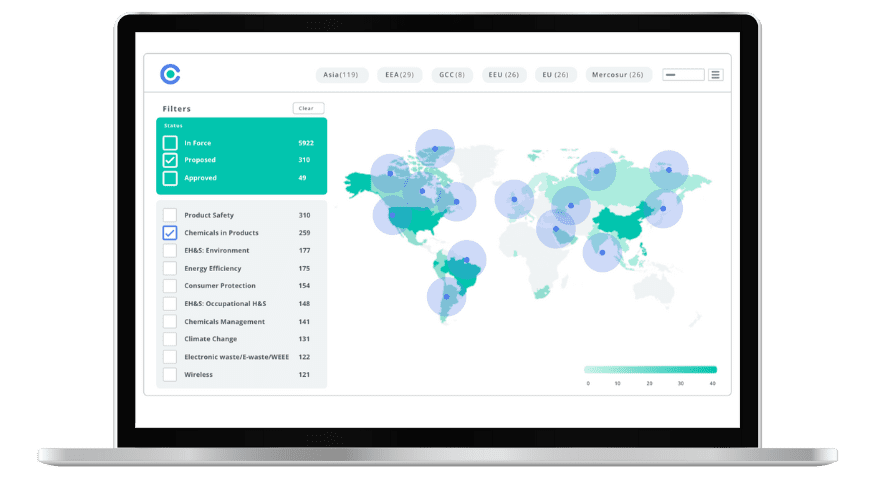
Simplify Corporate Sustainability Compliance
Six months of research, done in 60 seconds. Cut through ESG chaos and act with clarity. Try C&R Sustainability Free.


